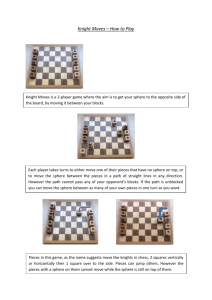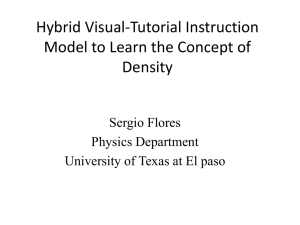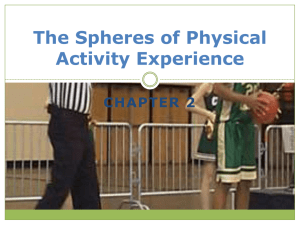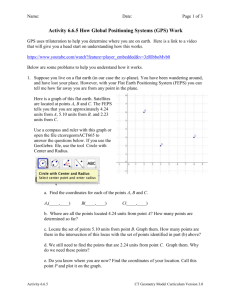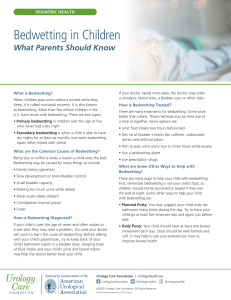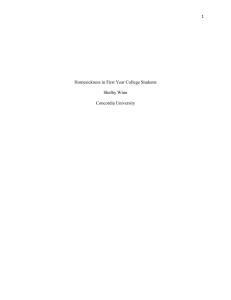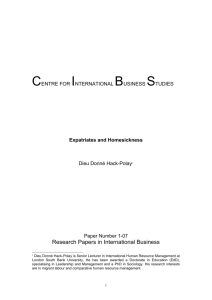Pre-Camp Teacher Information Packet
advertisement
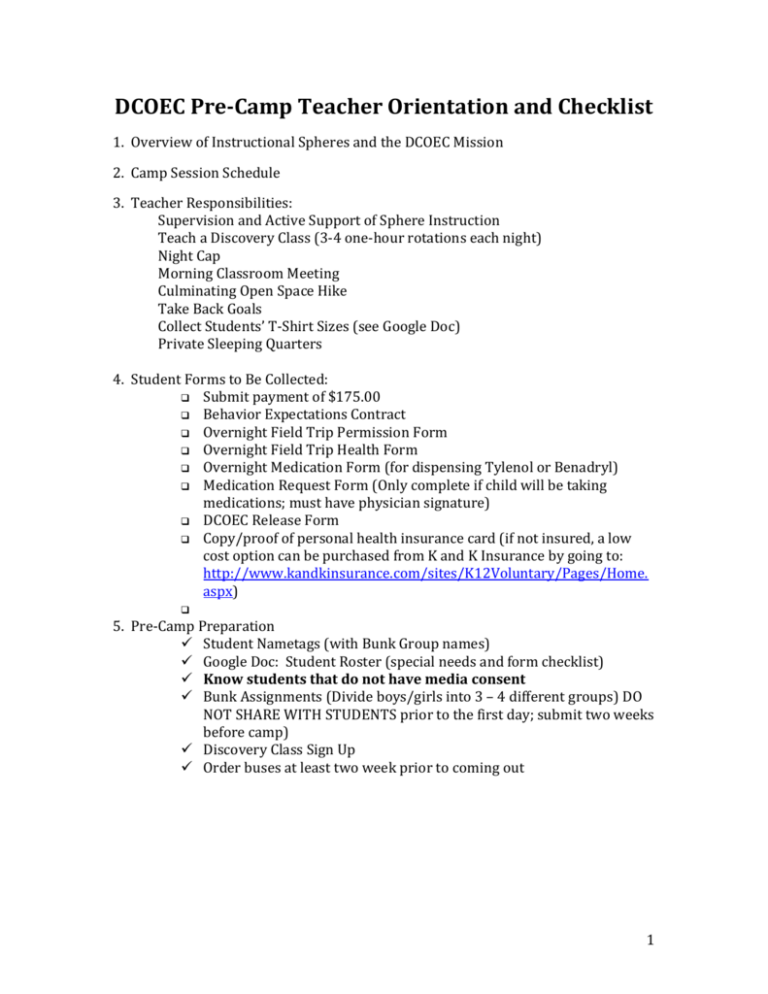
DCOEC Pre-Camp Teacher Orientation and Checklist 1. Overview of Instructional Spheres and the DCOEC Mission 2. Camp Session Schedule 3. Teacher Responsibilities: Supervision and Active Support of Sphere Instruction Teach a Discovery Class (3-4 one-hour rotations each night) Night Cap Morning Classroom Meeting Culminating Open Space Hike Take Back Goals Collect Students’ T-Shirt Sizes (see Google Doc) Private Sleeping Quarters 4. Student Forms to Be Collected: Submit payment of $175.00 Behavior Expectations Contract Overnight Field Trip Permission Form Overnight Field Trip Health Form Overnight Medication Form (for dispensing Tylenol or Benadryl) Medication Request Form (Only complete if child will be taking medications; must have physician signature) DCOEC Release Form Copy/proof of personal health insurance card (if not insured, a low cost option can be purchased from K and K Insurance by going to: http://www.kandkinsurance.com/sites/K12Voluntary/Pages/Home. aspx) 5. Pre-Camp Preparation Student Nametags (with Bunk Group names) Google Doc: Student Roster (special needs and form checklist) Know students that do not have media consent Bunk Assignments (Divide boys/girls into 3 – 4 different groups) DO NOT SHARE WITH STUDENTS prior to the first day; submit two weeks before camp) Discovery Class Sign Up Order buses at least two week prior to coming out 1 DCOEC IMPORTANT INFORMATION FOR TEACHERS Overview of the DCOEC Experience During the day students will rotate in their homerooms through learning modules or "spheres" instructed by a certified teacher from our planning team. There will also be approximately 3 to 4 high school leads with each classroom who will also be assisting. It is the intent that these activities will become part of bigger units of study that you have planned during the school year. Our program specialists are available to be a resource for planning this units and providing suggestions on how these activities might be embedded. The following is a quick overview of each sphere: Biosphere "The place on Earth's surface where life dwells." Biospheres are any closed, selfregulating systems containing ecosystems. It is the global ecological system integrating all living beings and their relationships. In this sphere, students will explore the various ecosystems that exist on the site – and the impact that the other spheres have had on these systems. Students will track wildlife and look for habitat indicators using a variety of methods and techniques. Hiking through various biomes and zones include the forest, riparian, shrub lands, and grasslands. Geosphere Geosphere refers to the solid parts of the Earth. The term geosphere is often used to refer to the densest parts of Earth, which consist mostly of rock. It also pertains to the inside of the Earth or other planets or bodies. In this sphere students will explore constructive and destructive changes to the earth such as tectonic plate movement, volcanic activity, weathering, chemical changes and erosion. Hydrosphere Hydrosphere consists of the combined mass of water found on, under, and over the surface of a planet. The movement of water around, over, and through the Earth is called the water cycle, a key process of the hydrosphere. Students will explore water erosion, creek sampling, the water cycle, water usage and conservation, macro invertebrates, and water quality testing. Learners will look at irrigation channels and the impact on surrounding agriculture. Atmosphere This sphere includes both the solar system and anything that pertains to the sky – which includes weather, clouds, temperature, climate, renewable and nonrenewable resources, space, solar system and astronomy. In this sphere students explore meteorology predicting weather, layers of the atmosphere, and resources that are renewable and nonrenewable. 2 Sociosphere We have coined the name of this sphere to include explorations of how humans interact with each other. This includes the study of history, how humans influence the other spheres, and their environmental impact (strategies for sustainability, conservation and wilderness survival would fall under this sphere). One of the activities is a Heritage Hunt, where students use a GPS to find various artifacts that teach the history of Douglas County and their surroundings. Experiences in this sphere also include: team building activities, high and low ropes courses, and a dual zip line. The LIFE Center culture and traditions also fall under this sphere that includes screening t-shirts for the next group, designing ceramic tiles to leave behind, flag raising/lowering ceremonies, campfire, skits, songs, family style meal serving, night hike, field games and other discovery opportunities. Discovery Classes Each school group will have a menu of discovery classes that they can choose based on their interest and expertise of classroom teachers. These may include: Archery, Robotics, Culinary Arts, Rocketry, Bocce Ball, Sand Painting, Survival Skills, Team Building Games, Sand Bottle Art, Poetry Hike/Reading, Community Bike, Stargazing/Telescope Viewing, Camp Songs, Dream Catchers, Gardening, Water Color Painting, Recycle Creations, Drawing/Sketching, Karaoke, iPads, Knitting, crochet, hand weaving, Friendship Bracelets, Chess or other thinking games, Drama, Owl Pellets, Fly Tying, Origami, and Dance Students with Special Needs If a student has an educational assistant for the majority of his/her school day, arrangements should be made for the student to also have an educational assistant at the Douglas County Outdoor Education Center. This is the school’s responsibility. In order to ensure that this students has a successful time, please do the following: Provide as much pertinent information as possible about the student’s needs Consult with the Special Education teacher Contact parents with a plan for accommodations, if appropriate Consult with the school nurse, if appropriate Communicate with the Program Director and enter information on student roster Create a plan for students without IEPs, but who might require some adaptations while at DCOEC. Input into google doc. Meals and Food Allergies Vegetarian, vegan, dairy fee and gluten free options are provided. The menu can usually accommodate some of the more common food allergies such as dairy and nut. Rare food allergies require students to bring their own food for our cook to prepare. Notify us of any food restrictions prior to attending camp. The school nurse will convey this information to the nurse at DCOEC. Our cook is happy to talk with any parents who have concerns. 3 Fees and Refunds Parents should make checks payable to the elementary school. In the event that a child has paid their tuition but conditions prevent their attendance, a full refund will be given. Partial refunds will be determined on a proportion of student time at the DCOEC (i.e. students who leave early). Students who are sent home due to discipline problems are NOT entitled to partial refunds. Phone Communication There is no cell service at the DCOEC. A landline can be used for emergency purpose (303-387-0720). We also have wireless on site. Homesickness Missing home and family are common during time spent at the DCOEC. Homesickness might be masked as a stomachache, headache, or other physical ailment. Homesickness can also manifest itself as being sullen or withdrawn and/or acting out. Each case is responded to on an individual basis. As a general rule, students will be unable to receive or place a call home while at the Center. Calling home makes the separation more difficult for both parent and child. Keeping the student involved, getting through short increments of time, and some extra TLC are usually enough to cure even the most homesick child. Bedwetting Bedwetting is a common occurrence and on we treat with utmost sensitivity and confidentiality. It is very helpful to know ahead of time if the possibility of bedwetting exists so that we can check on a daily basis. All beds are checked on the first day. If a child does wet the bed, staff will take them aside in private and talk with them about the procedure we have in place. Sleeping bag and clothes are taken discreetly, washed, dried and returned before bedtime. During the time of washing, staff attempts to find a similar bag to put in its place so that it is not obvious to cabin mates. Teachers may not know about a bedwetting problem since some parents are reluctant to bring up the subject. Teachers can help by casually mentioning the subject and encouraging parents and students to let you know if the possibility of bedwetting exists. Parents can help by being upbeat and supportive of the time away from home, and encouraging their son or daughter to make the most of the experience. Tremendous growth and self-confidence can occur when a student works through the homesickness and successfully makes it through the outdoor education session. In extreme cases where the child’s participation is dependent on communication home, please notify the DCOEC staff that will make a decision regarding this. 4 Nametags Student nametags are an important part of the DCOEC experience. They allow staff, teachers, and leaders to call students by name from the very beginning. This helps to make each student feel welcome and special. Please put bunk group names on the nametag. The nametags can be simple or elaborate; it’s up to you and your students. They must be safe (no sharp edges, pins, etc.), legible, durable, and waterproof. Minimum size: 3”X2” rectangle or 2-1/2” rounds (irregular shapes are also acceptable). Snacks Students are to bring healthy snacks for 3 – 5 snack breaks as listed on the studentpacking list. Parents are to label these snacks and/or place them in a Ziploc bag. These snacks can be left in students’ backpacks until they arrive at camp. The snacks will be collected and placed in bins in a classroom. Teachers will be assigned a homeroom while at camp and this snack bin can be left in this room for snack breaks. Loading the Bus You are responsible for ordering buses. We want you to arrive at the center at 10:00 and request the buses to return at 10:00 on your final day so we can load luggage on buses. You contact for ordering the buses will be Monica Tyler. Be sure to follow up and confirm that the bus is ordered correctly. In order to ensure an efficient arrival at the Center, load the boys on one bus and the girls on the other along with their luggage. Teachers Should Bring: √ Sack lunch for first day √ Bedding (sleeping bag or blankets/pillow) √ Pajamas or robe you don’t mind being seen in √ Hiking shoes and comfy shoes to change in afterwards √ Toiletries, towel, washcloth, etc. √ Clothing for layering √ Camera √ Sunglasses, sunscreen, hat, etc. √ Water bottle √ Backpack √ Flashlight √ Discovery class materials for approximately 60 – 80 students √ Materials for “Night Cap” (i.e. story time book, “night hike” materials, etc.) Contact Information Denny Ingram, Director Jaime Logsdon, Program Coordiantor dennis.ingram@dcsdk12.org jclogsdon@dcsdk12.org 5


